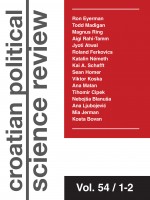Romani Identity, Cultural Trauma, Second-Class Citizenship and the Contemporary Context for Ethnic Political Representation in Hungary
Romani Identity, Cultural Trauma, Second-Class Citizenship and the Contemporary Context for Ethnic Political Representation in Hungary
Author(s): Roland Ferkovics, Katalin Németh, Kai A. SchafftSubject(s): Civil Society, Inter-Ethnic Relations, Politics and Identity, Identity of Collectives
Published by: Fakultet političkih znanosti u Zagrebu
Keywords: Cultural Trauma; Hungary; Roma; Racism; Political Agency;
Summary/Abstract: In this paper we discuss cultural trauma with regard to the Hungarian Roma. While the concept of cultural trauma is typically understood as connected to a discrete event and achieves recognition as cultural trauma through a process of broader social recognition, we argue that in the case of the Roma, cultural trauma is characterized not by a particular event but rather by a long history of exclusion, marginalization and persecution. Secondly, the cultural and discursive framing of Roma citizenship as “second-class” (and therefore as not “truly” Hungarian) operates as: 1) a causal factor in the historical trauma of the Roma; 2) a constitutive part of the trauma itself (the trauma as being “othered” while simultaneously having one’s traumatic experience denied); and 3) a barrier to the broader recognition and acknowledgment of that traumatic history and experience. We discuss data from recent fieldwork with Romani selfgovernment leaders to discuss how these phenomena manifest themselves as Romani leaders attempt to achieve political agency in the face of contemporary far-right political movements.
Journal: Politička Misao
- Issue Year: LIV/2017
- Issue No: 01+02
- Page Range: 74-93
- Page Count: 20
- Language: English

